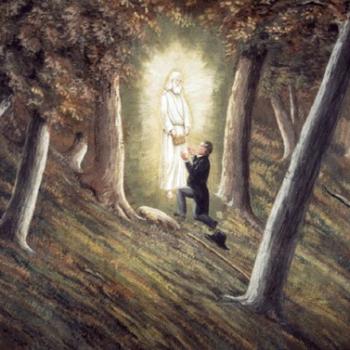October 11 is (Inter)National Coming Out Day, when on many college campuses and other locations, LGBTQI people will be celebrating their sexual orientations openly and proudly, often choosing the occasion to acknowledge these matters about themselves publicly for the first time.
So, in honor of this occasion: everybody sing! (To the tune of the theme song for The Flintstones:)
Gay Gods! Meet the Gay Gods!
They're the queerest kind of deity!
From the isle of Lesbos
They're more fabulous than Versace!
Ahem.
So, that may not be my best work of lyricism ever, but something as silly as this always comes to my mind when I think of the concept of "gay gods."
There is an event at PantheaCon, which I've been a part of for the past three years, called "Yes They Are! Meeting and Greeting the Queerest of Gods." It's a performance ritual, based on the very popular "Oracles of the Living Tarot" event that is a PantheaCon regular (and which was innovated by several people involved with that long-running ritual), in which ritualists portray a variety of different deities and figures from a number of cultures who are, in some sense, either queer or queer-friendly.
While a great deal of the emphasis in this event is not only giving those who attend a greater knowledge of particular aspects of our queer spiritual heritage, and for queer PantheaCon attendees to share an experience together, a lot of it is also based in coming out theology. Despite my reservations on that matter, I think this is a very important event to continue having and which I'd like to be a part of for as long as possible. It's one of those events in which real breakthroughs for people can often be achieved, and the appreciations we all receive for putting it on from attendees are touching, personal, beautiful, and staggeringly important.
And yet, I have to ask the question: is there really such a thing as a "gay god," and is there such a thing as a "queer god"? While the great Kurt Cobain would suggest a particular answer (on which more later), for my own historicist viewpoint, I have to take a slightly different angle of approach to the matter.
The concern for sexual orientation along the lines of "straight" and "gay" (and, if one is lucky, "bisexual") which so much of our culture has today is a relatively new phenomenon, in terms of these identity labels being things that sort people into different classes of human being. This is a novel concept for the most part in Western culture, only having been in operation in its present form since the mid-19th century. The concepts of "homosexual," "bisexual," and even "heterosexual" date from no earlier than that time. Certainly, premodern Western cultures, as well as many non-Western cultures, had their own ways of defining gender, sexuality, and sexual orientation previously, some of which are close to the concepts we mostly deal with, others of which were not. But, for the majority of polytheistic cultures throughout world history, the various categories into which deities could be sorted—chthonic or ouranic, immanent or distant, universal or local, and many more besides—did not include "queer" and "not-queer."
Indeed, if one were to apply the categories of sexual orientation to the male deities of the Greek pantheon (as well as a great many of their heroes and demigods), one would find that those with recorded homoerotic tendencies include ALL OF THEM with the exceptions of Hades and Ares. Very interestingly, given the tendencies of Greek gods to have liaisons with mortal males and the often inevitable youthful deaths of the lovers, the god most closely associated with death has no such relationships. Likewise with the god of war, since warrior homoeroticism is amply attested in Greek society, as well as in many other European (and other regions') cultures, as the basis for the military ethics of the Spartans, the Sacred Band of Thebes, and the exemplary myths of Achilles and Patroklos, amongst many other possibilities.
I've heard some people, including Pagans and polytheists, argue that the deities don't really have gender or sex like humans do, and that therefore concepts like sexual orientation don't really apply to them outside of the fancies of poetic myth. I find that suggestion hard to accept, considering that a divine heterosexual coupling is at the heart of a great many modern Pagan rituals, cosmologies, and theologies. If there really is no sex or gender amongst the deities and such things really don't matter, then how come in the rituals and myths of the majority of mainstream Pagans who celebrate the Great Rite, the God never gets it on with another God, or the Goddess doesn't ritually join with other Goddesses? Indeed, I've expressed previously that I think that sex and gender, while fluid with many deities, is if anything even more heightened among them, so that couplings of all different sorts with any number of possible gender combinations, are more the norm than the exception with the gods.





